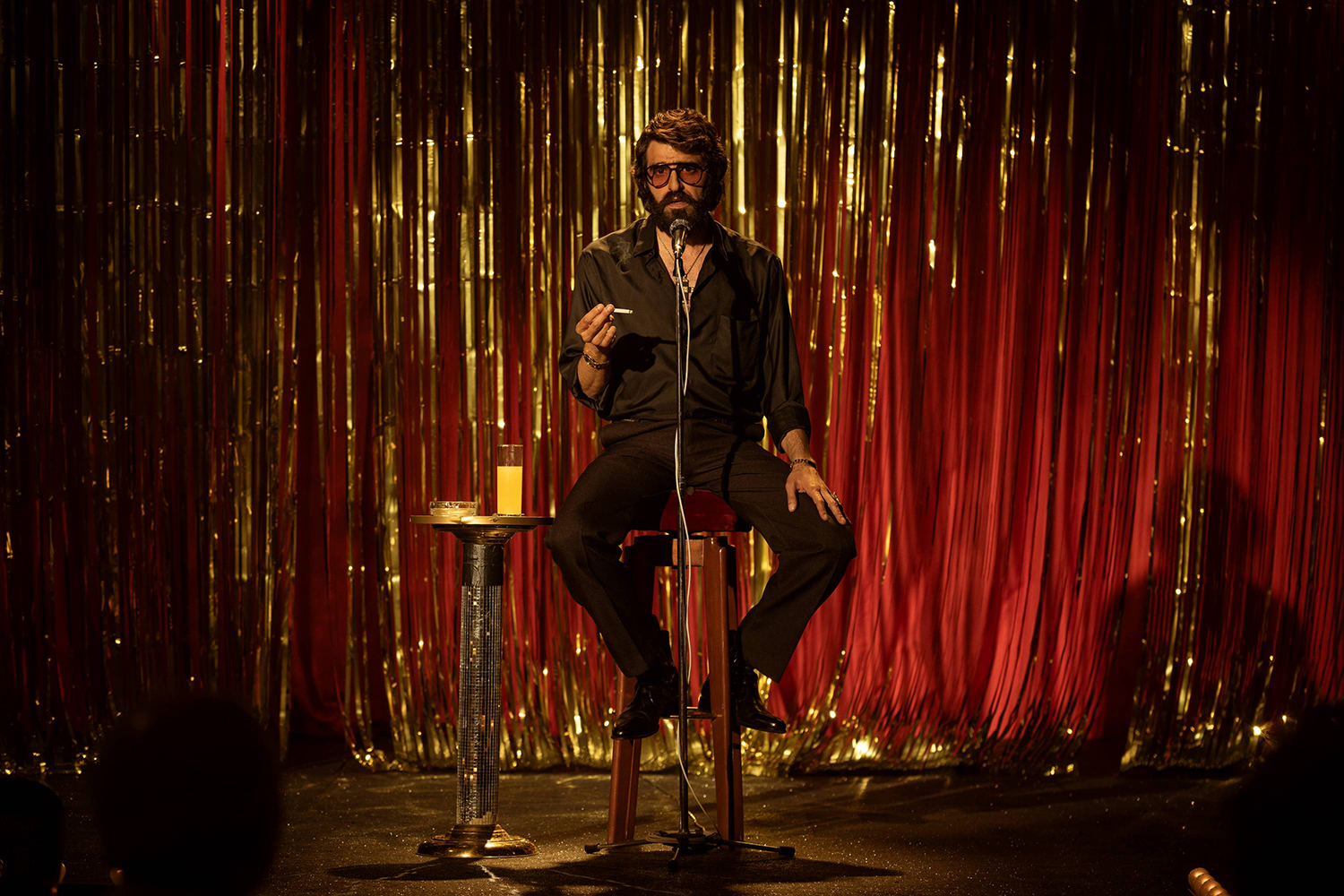
David Verdaguer as Eugenio in a scene from "Jokes & Cigarettes" (Photo courtesy of Outsider Pictures)
South Florida movie buffs who frequent Coral Gables Art Cinema will likely notice a shift in programming this week, away from buzzy late-summer titles.
In addition to the absorbing, refreshingly candid “Merchant Ivory” documentary that showed over the weekend (seriously, seek it out when it becomes available for digital rental), there are two other new releases that have been flying under the radar. Let's call what they bring to the table a taste of Spain.
This pair of movies from the Iberian peninsula are 2023 productions that are finally making their way stateside, blending laughs and pathos to varying degrees of success. They boast polished production values and come from veteran filmmakers with decades-long careers and more than twenty directorial efforts each under their belt. How do their new efforts measure up? Let's take a look.
“Jokes & Cigarettes”: He sits on the stage almost like he can't be bothered to be there. The man with the dark shades and vaguely standoffish demeanor says nothing. He lights up a ciggie. Cue the not-so-dramatic pose. Then he starts the first joke. His brand of humor is anecdotal, not always wholesome, but the spice level never goes beyond a PG-13 level, delivered in a deadpan monotone. The Leonard Cohen/Lenny Bruce vibes are strong with this one.
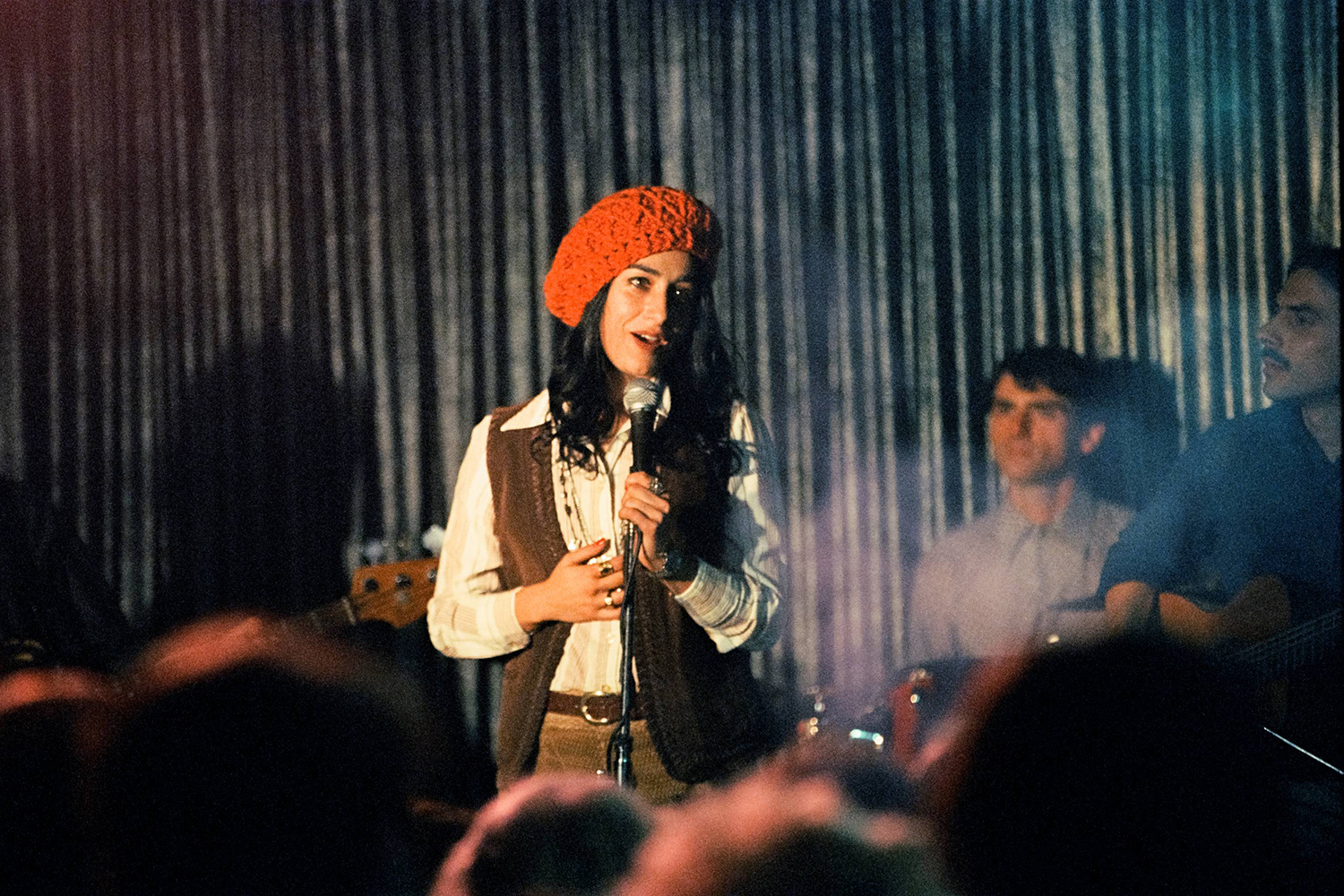
Carolina Yuste as Conchita in a scene from "Jokes & Cigarettes" (Photo courtesy of Outsider Pictures)
There is every reason why Catalan stand-up comedian Eugenio ought to have bombed every time he walked onstage. His jokes were occasionally clever, but more often than not they were kind of lame. Ah, but there was something about his off-the-cuff telling of these “acudits,” these stories with the shopworn punch lines, that drew you in all the same, as if it were just the two of you sitting in a smoky bar.
It wasn't always this way for Eugenio (David Verdaguer), born Eugenio Jofra Bafalluy, and the arc that drives director David Trueba's disarmingly sweet, thoroughly familiar biopic hinges on a love story that's intricately intertwined with his protagonist's rise to fame.
Eugenio is instantly smitten when he first sees folk singer Conchita Alcaide Rodríguez (Carolina Yuste) performing at a Barcelona cafe circa 1967. Trueba, who based the film on a memoir written by Eugenio's son, precedes the cafe gig with a “meet cute” on a public transit bus that feels like it was plucked from a rom-com.
A business proposal follows. Eugenio suggests expanding Conchita's solo act to a duo, with his background vocals propping up her lilting pipes. Thus, Els Dos is born. Toil and marriage follow, and it's not until 1975, when Conchita needs to leave town to be with her ailing mother, that the idea of a temporary stand-up routine enters the picture. With a gentle push from Conchita, Eugenio, who sees himself as a professional musician first and foremost, reluctantly agrees. And guess what? The audience laps it up.
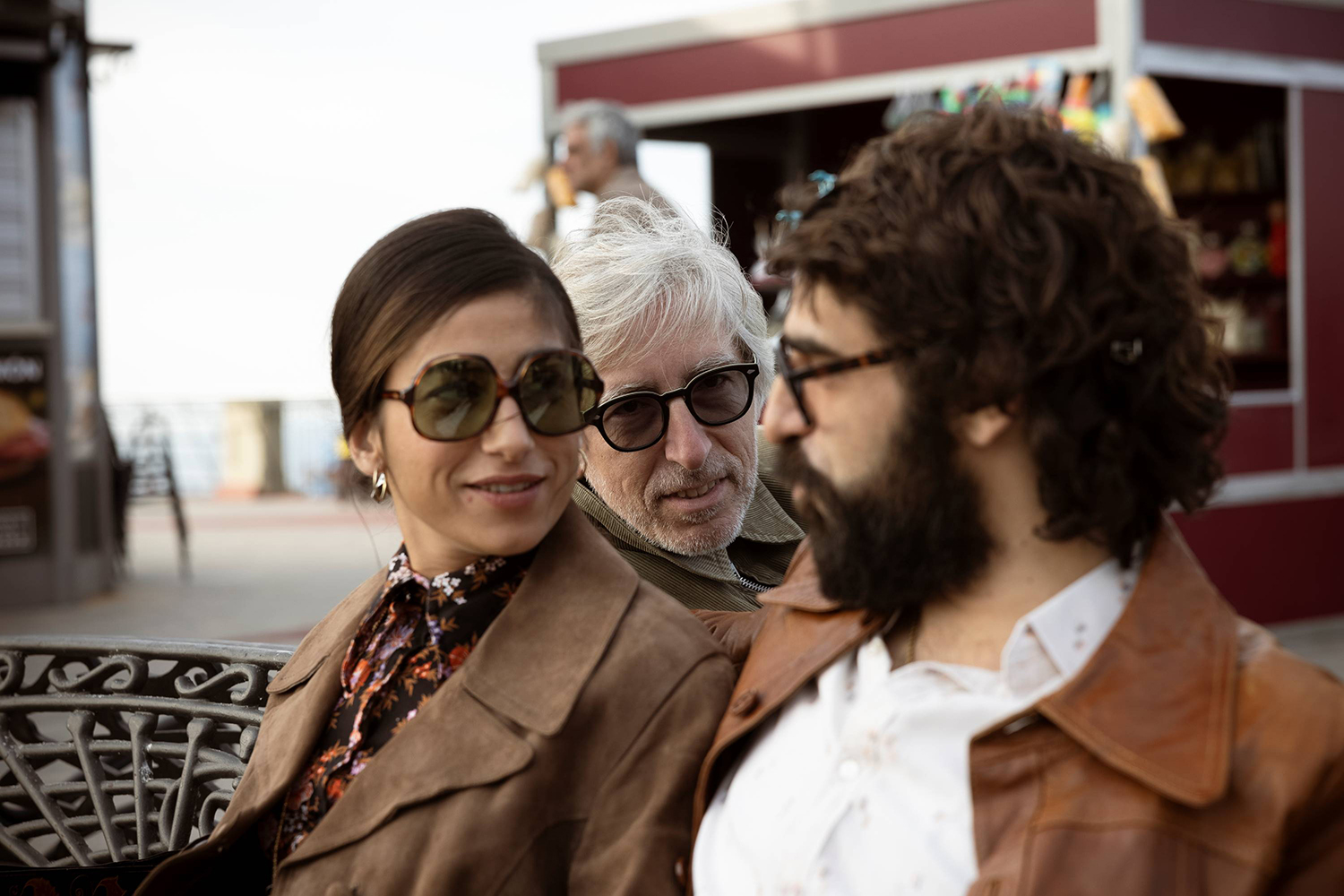
Carolina Yuste, director David Trueba and David Verdaguer on the set of "Jokes & Cigarettes" (Photo courtesy of Outsider Pictures)
What comes next plays like an inversion of “A Star Is Born,” as his success eclipses hers, and the demands of his newfound comedy career requires him to be away from home for long stretches. Trueba is initially able to juggle the more lighthearted and serious elements of this showbiz tale, with tons of affection for his real-life characters, but there's a preciousness to his depiction of Eugenio's rise to stardom that holds “Jokes & Cigarettes” back. One keeps hoping for more scenes like the one where Eugenio receives a rude awakening in the form of a scathing review of his Madrid gig.
By that point in the film, Trueba is zeroing in more on the toll Eugenio's fame takes on his marriage, as well as the medical challenges that Conchita faces. The onstage scenes that give “Jokes & Cigarettes” its flair cede into the background, and the film increasingly becomes a domestic melodrama, Yuste remains a compelling screen presence throughout, even as her role is increasingly limited to her health battle. All of this is handled with sensitivity, but the pendulum too often swings back to the serious side, so much so that one wonders what Eugenio, who passed away in 2001, would have made of this warm, drippy, slickly lensed portrait. He likely would have reduced it to one of his self-deprecating “acudits.”
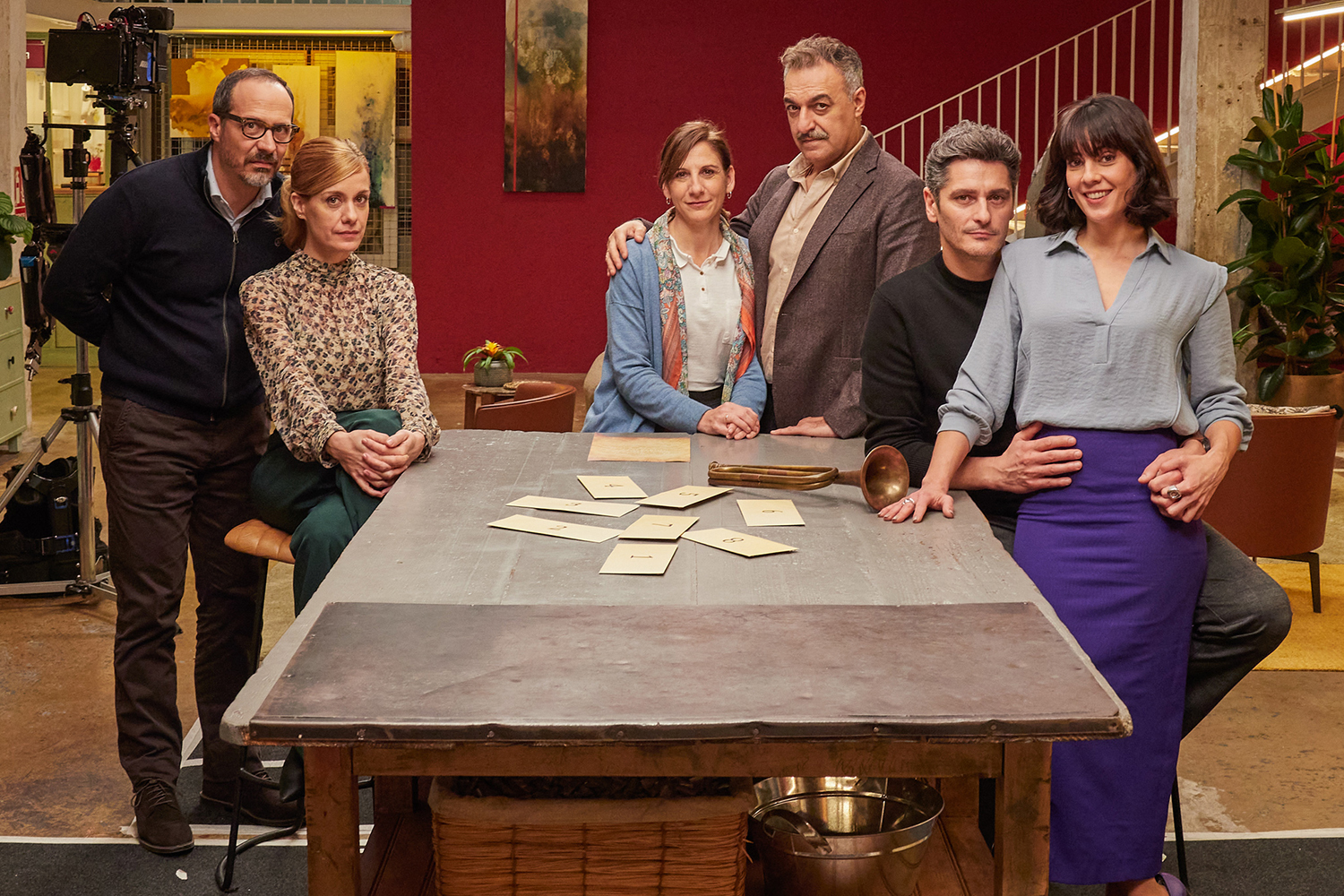
Fele Martinez as Daniel, Alexandra Jimenez as Laura, Malena Alterio as Marta, Juan Carlos Vellido as Roberto, Antonio Pagudo as Esteban and Eva Ugarte as Carla in a cast photo for "Under Therapy" (Photo courtesy of Latido Films)
At its best, “Jokes & Cigarettes” nails the low-key charm that gave Eugenio his wide appeal, Trueba provides a ripped-from-the-headlines backdrop that places the story in the context of a momentous period in Spanish history, As for Verdaguer, he capably brings the beloved humorist to life, imbuing the role with a gravity that recalls Oscar Isaac, even as his onstage look brings to mind early-1980s Martin Scorsese and Roy Scheider in Bob Fosse's Lenny Bruce biopic. He tears through and rises above Trueba's prestige-movie trappings. Okay, his star quality doesn't always win the day, but it's enough.
“Under Therapy”: They walk into the agreed-upon venue for their appointment, unaware that the group therapy session that's about to get underway will be cathartic in ways some of them won't see coming. The trap has been set, for the characters and for viewers.
The three couples at the center of writer-director Gerardo Herrero's skillfully crafted adaptation of Matías del Federico's 2015 stage play have enough marital issues to fill one season of a streaming series, and then some. Daniel (Fele Martínez) and Laura (Alexandra Jiménez), a fortysomething pair, seem to only snipe at each other; the fissures, one senses, are profound. Several years older than them, Roberto (Juan Carlos Vellido) and Marta (Malena Alterio) come across as the more traditional Old World union: his silent, alpha-male demeanor a sharp contrast to her withdrawn, fidgety behavior. Rounding up is the younger, sexier couple: smarmy, outgoing Esteban (Antonio Pagudo) and vivacious commitment-phobe Carla (Eva Ugarte).
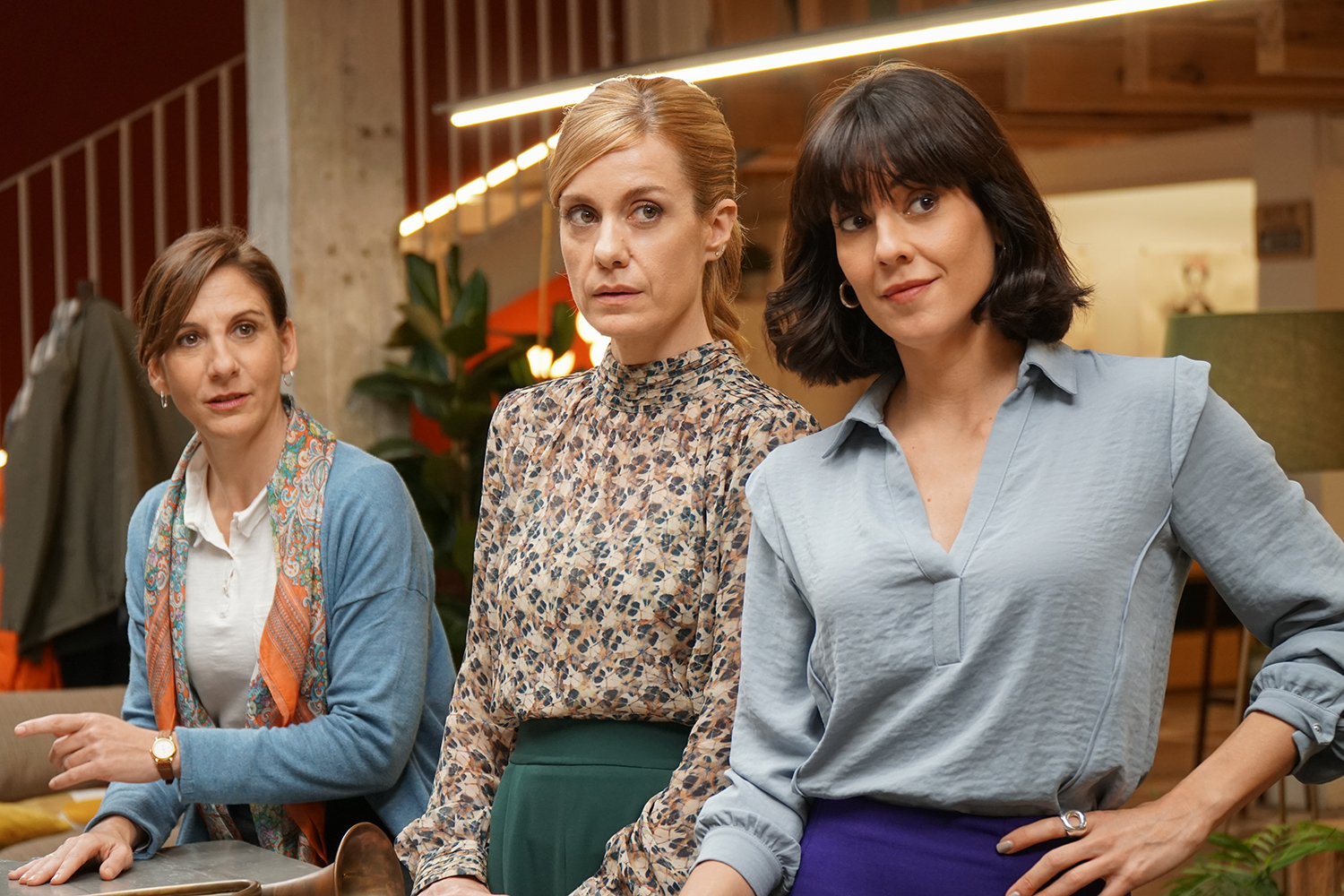
Malena Alterio as Marta, Alexandra Jimenez as Laura and Eva Ugarte as Carla in a scene from for "Under Therapy" (Photo courtesy of Latido Films)
A question arises minutes after “Under Therapy” begins. No, not whether or not psychotherapy will help repair the cracks in these marriages, but whether these couples' neuroses and hangups can overcome the material's high-concept structure. The couples are surprised to find their therapist MIA. In her place is a note and a bunch of numbered envelopes. She leaves clear instructions: They can help each other get to the root of their problems. It's a stunt that's certain to be counterproductive in real life, For dramatic purposes, having these couples behave like reality show contestants, ripping open envelopes to reveal their next mission to fulfill, is pretty engrossing. Also, distractingly gimmicky.
It's a large hurdle to jump over, but it's clear this solid sextet of actors like a challenge, none more so than the esteemed Martínez.
Oh, you've seen this dude before. You probably don't recognize the 49-year-old with that balding head and angry-man-yelling-at-cloud bluster, but Martínez made a name for himself in “Tesis” and “Open Your Eyes,” a pair of watchable genre entries by filmmaker Alejandro Amenábar, who himself made a splash on this side of the pond with the frightening, Nicole Kidman-fronted ghost tale “The Others.” A few years later, Martínez headlined “Bad Education,” Pedro Almodóvar's semi-autobiographical potboiler, as a surrogate for the legendary “Talk to Her” director.
In the couple of decades since the latter film, Martínez has only gotten better at his craft, In “Under Therapy,” he throws his disenchanted married man baggage in your face, daring us to hate Daniel and inviting us to sneer at the toxicity that makes him an irresponsible father and a resentful husband. Reader, I could not bring myself to dislike him, on account of Martínez being so damn good in the part. The rest of the cast doesn't make quite the same overwhelming impression, but they spar and squabble like a well-oiled machine.
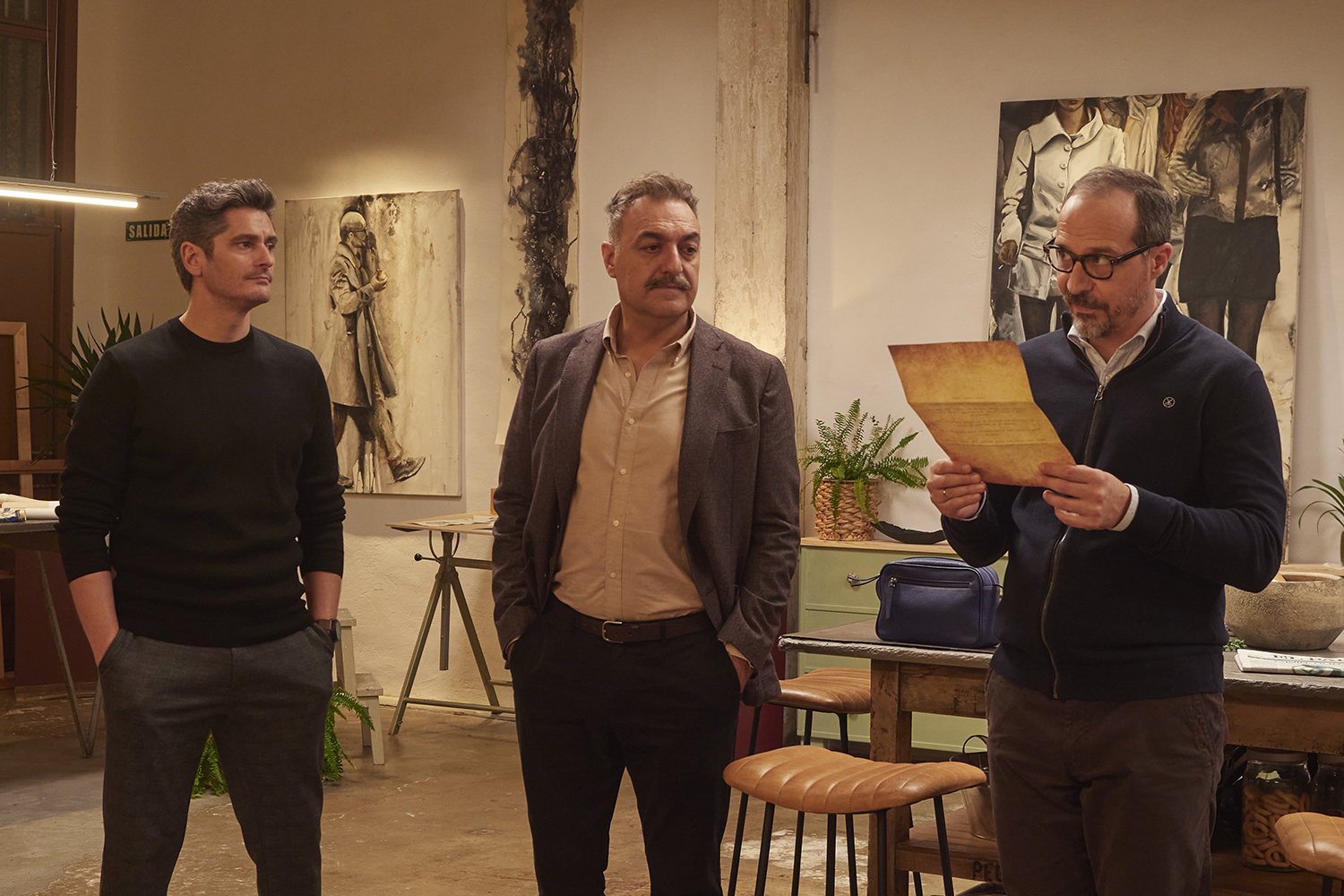
Antonio Pagudo as Esteban, Juan Carlos Vellido as Roberto and Fele Martinez as Daniel in a scene from "Under Therapy" (Photo courtesy of Latido Films)
More like oil and water in some instances. Esteban's New Age, enlightened schtick rubs Daniel the wrong way, and their friction keeps “Under Therapy” on its toes, reveling in and occasionally enhancing the source material's stagebound nature. Herrero does little to open up the play, but what he does with the camera in a single setting keeps things dynamic and flowing smoothly over a compact 93 minutes.
And just when you think you have “Under Therapy” figured out, it reveals an additional stunt move it's been keeping under wraps. The eleventh-hour reveal may have worked well on the stage, but in this cinematic form, it made this viewer feel like a sucker. Not only is it not believable for a second, it cheapens and undermines the genuinely pressing marital dilemmas the film has tackled considerably well, at least until its rug-pulling final minutes. This is one feature-length session that flubs the landing, button-pushing movie therapy that sends you home feeling a bit frustrated and more than a little manhandled. Your mileage may vary.
You have one more chance to catch “Jokes & Cigarettes” and “Under Therapy” at Coral Gables Art Cinema this Thursday. After that, both films should become available for digital rental in the coming months.




